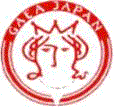Gaea Japan
 | |
| Acronym | GAEA |
|---|---|
| Founded | 1995 |
| Defunct | 2005 |
| Headquarters | Japan |
| Founder(s) | Chigusa Nagayo |
| Owner(s) | Yuka Sugiyama Chigusa Nagayo |
Gaea Japan (trademarked as GAEA Japan) was a Japanese women's professional wrestling promotion. GAEA's name comes from the Greek mythological goddess of the Earth, Gaea or Gaia.
History[]
GAEA was founded in 1995 by Chigusa Nagayo, a professional wrestler who achieved huge success in the 1980s with her tag team partner, Lioness Asuka, as the Crush Gals.
GAEA's formation was first announced at a press conference held on August 24, 1994. Present at the event were charter members Nagayo, KAORU, and Bomber Hikaru. GAEA's first rookie auditions were also held on this occasion. Their rookie class included Meiko Satomura, Toshie Uematsu, Chikayo Nagashima, Sonoko Kato, Sugar Sato, Maiko Narita, Chihiro Nakano, and Makie Numao.[1]
On April 15, 1995, the new promotion held its first show. It was at Tokyo's Korakuen Hall and was called Memorial First Gong.[1] The event was a sellout and received good press. From this point on, GAEA held monthly shows at Korakuen and also occasionally went on the road to other Japanese cities.
GAEA's reputation grew as a result of the acquisition of some well-known wrestlers and the organization of some very successful interpromotional shows. GAEA acquired highly respected freelance wrestler Akira Hokuto on September 16, 1996 and Toshiyo Yamada on July 3, 1997. The promotion established a relationship with the Japanese hardcore promotion Frontier Martial Arts Wrestling (FMW) on July 29, 1995, and worked with the prominent American promotion World Championship Wrestling (WCW) in 1996. As a component of the relationship with WCW two GAEA wrestlers, Akira Hokuto and Toshie Uematsu, became the first WCW Women's Champion and WCW Women's Cruiserweight Champion respectively.
GAEA's most famous storyline involved the reunion of 80's tag team sensations, the Crush Gals, in 2000. The Crush phenomenon in Japan was roughly akin to the American phenomenon of Hulkamania and the first appearance of the reunited partnership on May 14, 2000 at GAEA's fifth-anniversary show, drew the attention of the entirety of the Japanese press.
On March 15, 2004, a weekly show with matches from GAEA started on The Wrestling Channel.
On April 10, 2005, GAEA closed its doors for good with a farewell show at the Tokyo Korakuen Hall called Eternal Last Gong. The promotion closed while still being profitable due to a combination of Nagayo's desire to retire, reliance on free agent wrestlers, and many of the original members being inactive or wanting to move on.[2]
On February 5, 2020, Nagayo announced a one-night return for GAEA on April 15, 2020 in Korakuen Hall.
Championships[]
GAEA established the two All Asia Athlete Women's (AAAW) titles (with AAAW being a play on the WWWA acronym of All Japan Women's Pro-Wrestling's titles), a singles championship and a tag team championship, on November 2, 1996. Originally, the singles belt was labeled "Heavyweight", while the tag team belts were labeled "Junior Heavyweight", but the weight class requirements were eliminated on May 31, 1998. The first AAAW Champion was GAEA founder Chigusa Nagayo. The belt was subsequently held by some of the most prominent Japanese women's wrestlers of the 1990s including Manami Toyota and Aja Kong. The AAAW Tag Team Championship was first held by Meiko Satomura & Sonoko Kato. Also, Uematsu's WCW Women's Cruiserweight Title was solely defended in GAEA after Uematsu won it in the United States until the title was abandoned after GAEA and WCW ceased their relationship.
Final champions[]
| Championship | Last Champion(s) | Previous | Date Won | Location |
|---|---|---|---|---|
| AAAW Single Championship | Aja Kong | Meiko Satomura | April 3, 2005 | Yokohama, Japan |
| AAAW Tag Team Championship | Ran Yu-Yu & Toshie Uematsu | Carlos Amano & Manami Toyota | April 3, 2005 | Yokohama, Japan |
Alumni/notable guests[]
- Aja Kong
- Akira Hokuto
- Amazing Kong
- Ayako Hamada
- Carlos Amano
- Chigusa Nagayo
- Chihiro Nakano
- Chikayo Nagashima
- Devil Masami
- Kaoru
- Lioness Asuka
- Meiko Satomura
- Maiko Narita
- Makie Numao
- Manami Toyota
- Mayumi Ozaki
- Ran Yu-Yu
- Sonoko Kato
- Sugar Sato
- Toshie Uematsu
- Toshiyo Yamada
References[]
- ^ a b "GAEA Memorial First Gong In Korakuen". cagematch.net. Retrieved 2019-03-16.
- ^ "GAEA解散真相". Kakutolog (in Japanese). Kakutolog. November 24, 2011. Retrieved March 16, 2019.
External links[]
Archived Official Website at the Wayback Machine (archived August 16, 2000)
- Japanese women's professional wrestling promotions
- Organizations established in 1995
- 1995 establishments in Japan
- Organizations disestablished in 2005